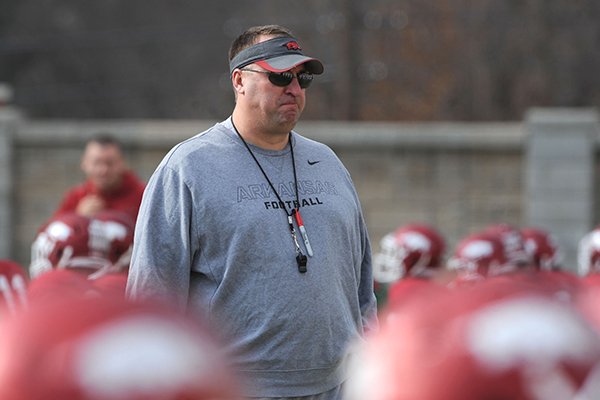When the talk started that Bret Bielema was being targeted by Nebraska to be its new head coach, the Arkansas coach quickly calmed the seas by saying he wasn't interested.
Many coaches, maybe most, would have used the opportunity to get a raise. Even administrators have found a job opening at another school as a way to increase their pay.
Not Bielema. He said he was whole Hog.
He is working on raises, but they are for his assistants. He would like for them to have more years guaranteed and a good pay raise.
That was one of the most quoted reasons for him leaving Wisconsin, that Athletic Director Barry Alvarez wouldn't pay the assistants enough to keep them from jumping ship.
Apparently Alvarez hasn't changed. A story last week in USA Today on assistant coaches' salaries showed that Wisconsin's total salary base for assistants was $2.3 million this season.
That would rank the Badgers dead last in the SEC for assistants' pay, although private school Vanderbilt doesn't share that information.
The Razorbacks were tied for seventh in pay in the SEC at $3.2 million, but Jim Chaney ($550,000), Sam Pittman ($500,000) and Robb Smith ($500,000) receive the lion's share of that.
Pittman got a big raise when Nick Saban tried to lure him to Alabama to coach the offensive line.
That is why Bielema is trying to level the playing field. The lowest-paid on the staff is $200,000.
While that is really good money for the average person, college athletic salaries have become distorted because of TV money, or in the case of the SEC, E$PN.
Head coaches are making more in a year than most people will make in a lifetime. That's just the way the business model works, although it has cost several schools millions when they've had to fire a coach.
The school with the highest payroll this past season was LSU at $5.4 million, but John Chavis and Cam Cameron knocked down $1.3 million each.
Alabama was next at $5.2 million, with Kirby Smart topping the charts at $1,350,000.
Auburn came in third at $4.3 million, but that will go up following the hiring of defensive coordinator Will Muschamp, who reportedly will make $1.6 million and become the nation's highest-paid assistant. Texas A&M ($3.4 million) was next, followed by South Carolina and Georgia ($3.3 million), Arkansas, Florida and Tennessee ($3.2 million), Missouri ($3.1 million), Kentucky ($2.7 million), Mississippi State ($2.6 million) and Mississippi ($2.5 million).
Obviously, Missouri, Mississippi State and Ole Miss got the most bang for their buck this season.
What Bielema and all the other head coaches know is that a stable program is what parents are looking for from the university where their son will spend three to five years.
That said, no head coach would try to hinder an assistant from becoming a head coach at a school where they have a chance to succeed. So there will always be some turnover, but head coaches want and need as little as possible.
That helps recruiting, it helps the kids when they get to campus and it usually ends up paying dividends on the field. The longer a player is in a system, the better chance he has of improving.
Some of that improvement was obvious in Bielema's second season at Arkansas. The offensive line, tight ends and almost the entire defense were better than last season.
So he is lobbying Athletic Director Jeff Long, his boss, for better contracts for his assistants instead of using the leverage to get himself a pay raise.
No doubt that means a lot to his staff.
Sports on 12/17/2014

